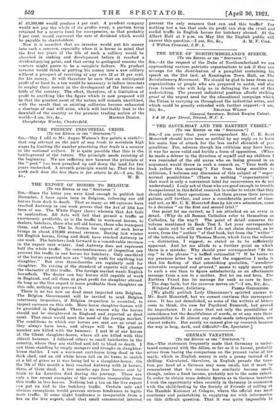" THE SAUCE-BOAT AND THE EARTHEN VESSEL." [To awe EDITOR
or THE " SFEcTrros."] am sorry that your correspondent Mr. C. K. Scott Moncrieff should have been so nettled by my reply as to leave his main line of attack for the less useful skirmish of per- pnalities. For, adverse though his criticism may have been, it was far more valid and fertile a form of opposition. (When he made a detour in the direction of myself and my children I was reminded of the old nurse who on losing ground in an argument would throw in such a remark as, " Your teeth do look yellow this morning.") Far from being sensitive to criticism, I welcome any discussion of this subject of " super- normal possibilities." (There is nothing " supernatural "; that word is only a convenient label for occurrences we do not understand.) I only ask of those who are good enough to trouble toexperiment in this fieldof research in order to refute that they should extend their operations. Let them pursue their investi- gations still further, and over a considerable period of time, and not, as Mr. C. K. Moncrieff doesby his own admission, come to a decision " on the first and second trial."
One point let me correct, as I am attacked on an error in detail. (Why do all Roman Catholics refer to themselves as Catholics, by the way?) The point of detail concerns the volume mentioned in Book Test I. Let your correspondent look - again and he will see that I do not claim descent, as he avers, from the " author " of that book, but from the " writer " of the letters, edited by Thomas Moore, which form the volume —a distinction, I suggest, so stated as to be sufficiently apparent. And let me allude to a further point on which there is a mistake. Why should your correspondent " fit the cap " in the phrase " a baffled rationalist "? If he turns to my previous letter he will see that the suggestion I make is that his finding of that astonishing quotation, " wanderer miserable surprised and grieved," seems to apply more aptly to such a one than to figure satisfactorily as an affectionate message from a son to a mother. But let me end here. The Earthen Vessel has its message for such as care to hear. "The dogs bark, but the caravan moves on."—I am, Sir, &c., [We gladly publish Lady Glenconner's spirited answer to Mr. Scott Moncrieff, but we cannot continue this correspond- ence. It has not demolished, as some of the writers of letters seem to think, the case for Psychical Research, but proved its importance. It is clear that not only the possibilities of coincidence but the deceitfulness of words, or at any rate their expansibility to fit almost any ready-made interpretation, are almost infinite. But surely we cannot give up research because the way is long, dark, and difficult?—ED. Spectator.]


































 Previous page
Previous page